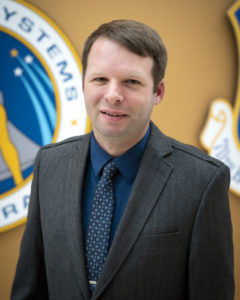Government Relations
Science in Service: Applying Psychological Science in the U.S. Air Force
Science in Service highlights psychological scientists who work in government or apply their research to policymaking. Would you be a good fit for this column? Write [email protected].

I am a research psychologist at the Air Force Research Laboratory (AFRL) at Wright-Patterson Air Force Base. I have been working in defense-related research since 2018, but I’m relatively new in my role at AFRL. With around 6,500 employees, AFRL is a large research organization that serves as the primary research, development, testing, and evaluation efforts for the U.S. Air Force and the U.S. Space Force.
In my current role, I am part of a cognitive neuroscience research group and serve as the program lead for two areas of research. One area focuses on leveraging neuroscience techniques for the understanding and enhancement of decision-making for the types of tasks and scenarios that an airman might encounter on the job. Another area of work, which I inherited, focuses on the development of a testing environment for evaluating new commercial brain–machine interface devices for potential U.S. Air Force applications. I also provide project support for cognitive, statistical, or methodological work that involves evaluations of human performance and provide technical review to funding applications as needed.
The role that psychological science plays in my work changes depending on the project. Typically, I am part of a multidisciplinary team where I am one of the only team members with expertise in psychology. Projects that are smaller and more focused may have psychological science serving in a more prominent role where we conduct applied research to understand how specific aspects of human performance or cognition can be monitored, supported, or enhanced. For larger projects, psychological science may play a significant role but will likely be balanced with other scientific or engineering technical aims for the project.
Relative to academia, the biggest difference for me in terms of integrating psychological science into my work at AFRL is the factors driving the research. As a graduate student and then postdoc, my work was theory-driven even when it was utilized in more applied settings. In contrast, my work at AFRL is more driven by the operational needs of the organization, and the leadership is typically eager to integrate inputs from all relevant domains. As a result, we may spend time decomposing performance of a bench version of an operational task into the cognitive-performance features and how the operator’s psychological and cognitive characteristics contribute to task performance in order to understand how to enhance performance. Likewise, as new needs arise (e.g., monitoring airmen’s psychological well-being), there are opportunities to adapt existing psychological metrics and cognitive tasks into novel research programs.
Adapting skills and training to real-world outcomes
Given the practical realities of the academic job market, many undergraduate and graduate students may be considering jobs in industry or government. There are many roles at multiple skill levels, and the training we typically receive in psychology is useful in a variety of areas. The skills I have ended up using the most are research methods, experimental design, and statistical design and analysis. Experience with programming languages typically utilized in behavioral research (e.g., Python, MATLAB) is also valuable. Moreover, a certain level of intellectual promiscuity and breadth of interest and experience is an asset. The topics of research may change every 4 or 5 years as funding sources or leadership changes.
In retrospect, I would have liked to have more experience in graduate school developing research questions with potential applications in mind. During my dissertation defense, I struggled with a simple “So what?” question from a committee member. The committee member wanted to know how I thought my theoretically driven work mattered outside of the lab. Theoretically driven work is certainly important, but at the end of the day I have to be able to connect my work to a tangible real-world outcome. Developing that skill required a fundamental reconsideration of how I approach research.
Previous Science in Service Columns
-

Science in Service: Providing Behavioral Advice During a Pandemic
Michael Bang Petersen offers three principles for advising public policymakers based on his experience serving the Danish government.
-

Science in Service: Making Noise That Can’t Be Missed
Tom Hilton’s decades of government service as an industrial/organizational psychologist has shown me time and again that it is possible for research to affect public and organizational policies and practices
This article was initially published in the print edition of the May/June 2022 Observer under the title, “Taking Flight: Applying Psychological Science in the U.S. Air Force.”
Feedback on this article? Email [email protected] or scroll down to comment.




APS regularly opens certain online articles for discussion on our website. Effective February 2021, you must be a logged-in APS member to post comments. By posting a comment, you agree to our Community Guidelines and the display of your profile information, including your name and affiliation. Any opinions, findings, conclusions, or recommendations present in article comments are those of the writers and do not necessarily reflect the views of APS or the article’s author. For more information, please see our Community Guidelines.
Please login with your APS account to comment.